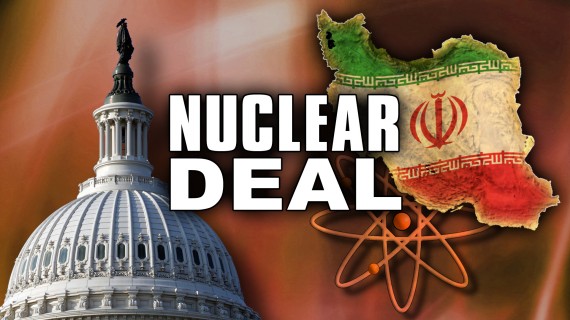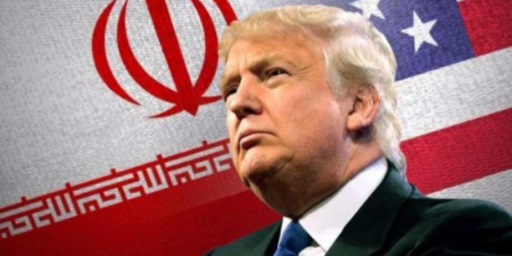As Far As Europe Is Concerned, The Debate Over The Iran Nuclear Deal Is Over
Congress is set to debate the Iran nuclear deal next month, but as far as Europe is concerned the debate is already over.
Among America’s European allies, there is no real debate over the Iran nuclear deal:
PARIS — Given the sound, fury and millions of dollars swirling around the debate in Washington over the Iranian nuclear deal, the silence in Europe is striking. It’s particularly noticeable in Britain, France and Germany, which were among the seven countries that signed the deal on July 14.
Here in France, which took the toughest stance during the last years of negotiation, the matter is settled, according to Camille Grand, director of the Strategic Research Foundation in Paris and an expert on nuclear nonproliferation.
“In Europe, you don’t have a constituency against the deal,” he said. “In France, I can’t think of a single politician or member of the expert community who has spoken against it, including some of us who were critical during the negotiations.”
Mr. Grand said the final agreement was better than he had expected. “I was surprised by the depth and the quality of the deal,” he said. “The hawks are satisfied, and the doves don’t have an argument.”
There are many reasons the nuclear deal hasn’t stirred up political passions in Europe. The Continent has not experienced the enmity that has characterized American-Iranian relations since the hostage crisis in 1979, which led to a break in diplomatic relations.
In the U.S., the Iran issue is much more polemical because it is part of a domestic debate,” said Ellie Geranmayeh, a policy fellow at the European Council on Foreign Relations.
European countries have maintained diplomatic relations with Tehran, with the exception of Britain, which reopened its embassy on Sunday, nearly four years after it was stormed by protesters.
Nor, in the European view, were there other choices besides negotiations, backed by sanctions. “No Europeans were seriously advocating the military option, which has been in the U.S. debate for years,” Mr. Grand said.
Also missing here is Israel’s active role in fueling opposition to this or, arguably, any agreement with Iran. In the United States, pro-Israel groups have spent heavily on a campaign to block the deal in the Congress, organizing meetings with Israeli diplomats and a videoconference with Prime Minister Benjamin Netanyahu of Israel, who has called the deal a “stunning historic mistake” that threatens Israel’s existence.
Although France’s main Jewish organization has expressed “very serious doubts” about the Iran deal, Mr. Grand said, its objections have not spilled into the political sphere.
“Netanyahu’s opposition was so extreme that it made it difficult for it to exist in any French debate,” he said. “Even critics couldn’t sign up to the Netanyahu narrative because it doesn’t offer a constructive solution.”
And then there is the money — huge sums being spent mainly by the pro-Israel groups, less by supporters of the deal — which shock Europeans unused to this kind of profligate lobbying. Some here are also baffled by the hyperbole coming out of Washington, with talk of a choice between war and peace, and oblique references to the Holocaust.
As seen from this side of the Atlantic, the shrill tone of the debate has worrying consequences, particularly when Republican presidential candidates talk about “undoing” the deal or when Senator Chuck Schumer, Democrat of New York, suggests keeping sanctions in place to prevent American and foreign companies from doing business in Iran.
Europeans regard sanctions as a diplomatic tool, the means to an end. Their concern here is that the Americans will use them as a form of open-ended punishment. “How this debate develops on Iran could potentially be a test case on sanctions,” said Ms. Geranmayeh, of the European Council on Foreign Relations. “The U.S. Congress may underestimate how much their debate is going to have repercussions on sanctions unity.”
The view from Europe is important in several respects to the upcoming debate on the Iran deal that we will once Congress returns from its recess after Labor Day. Primarily, of course, it emphasizes the extent to which opponents of the deal here in the United States are essentially alone in the world at this point. Outside of Israel, the broad consensus among the international community is supportive of the agreement that was reached in Vienna in July and there clearly seems to be strong momentum in favor of implementing it once all the legal technicalities have been taken of in Washington and elsewhere. This is important because it would seem to drive a large hole through the logic of most of the American opponents of the deal. According to these people, including both Republican Senators like Tom Cotton and Democratic Senators like Chuck Schumer, instead of approving this deal what we need to be doing is increasing the sanctions on Iran in order to get a better deal out of them. Based on these reports, though, it seems very clear that as far as the Europeans are concerned, the Iran nuclear deal is a done deal. If the United States Congress were to end up rejecting it, there’s absolutely no guarantee that we would able to simply return to the sanctions status quo that existed prior to the announcement of the deal in Vienna. It was already a virtual certainty, for example, that it would be next to impossible to convince the Russians and the Chinese to get back on board sanctions of the deal. Reports such as these seem to indicate it may be difficult to get our allies back on board with sanctions as well. If that’s the case, then the entire logic of the opponents of the deal would seem to fall apart and the arguments that proponents make about the dangers of killing the deal would have a lot more merit.
Beyond the Iran deal itself, though, this split between Europe and a significant portion of the United States according to a new poll also threatens to undermine international support in other areas. The quote I highlighted above is probably the best example of that, because it suggests what might happen in the event that Congress ends up killing the Iran nuclear deal. At that point, we would be dealing with European allies who clearly seem to think that what came out of Vienna, while far from perfect, is the best deal that could have been gotten under the circumstances. The United States, meanwhile, would be asking for renewed international cooperation in reimposing sanctions on Iran not because they have violated the deal, but because the Republican Congress thinks that tougher sanctions and more punishment would lead to a better deal. If our European allies aren’t going to cooperate there, then how likely is it that they’ll be willing to go along with us in future requests for international cooperation on sanctions? This would seem to be especially true is one of the Republicans who has promised to “rip up” the Iran deal on their first day in office somehow manages to win the Presidency. In that case, reneging on a deal that the rest of the world considers a done deal would only seem to damage the international credibility of the United States.
As for the debate on the Iran deal here in the United States, it seems as though the result is fair foreordained. As I’ve said before, while it seems likely that the Republican Congress will vote against the deal, the odds that both the House and the Senate will have enough votes to override the President’s veto are fairly slim. This has become more apparent over the past two weeks as several Democratic Senators who were previously on the fence have come out in favor of the deal. The most recent Senator to do that is Washington Senator Patty Murrary, who announced her support for the deal yesterday. With her announcement, The Washington Post now projects that there are 33 Senators who would in favor of the deal and against a veto override. The Hill’s whip count is at 29 Senators on the President’s side, but that’s largely because they aren’t counting Senators who have said they are leaning that way but haven’t formally announced their position. Whichever number you go by, though, the fact that most of the Senators still listed as “Undecided” are people who would seem to be more likely to support the President than the Republicans means that the odds in favor of a veto override as very, very low.
In the end then, the United States is likely to go along with the rest of the world and implement the nuclear deal. Before we there, though, there will be opponents of the deal who will try to stop it and convince Americans that we can return to the sanctions regime that brought Iran to the table to begin with. The reports out of Europe would seem to strongly suggest that this isn’t the case and that if the Iran deal did fail in Congress it would accomplish little more than tarnishing America’s diplomatic image around the world.







With this, W blowing up the Middle East, and AGW, is there some point at which you and James admit the Republican Party is a major threat to U. S. security?
Can’t wait for the howling when Iran buys Eurofighters instead of F35s. Some of our politicians seem to forget that the US represents less than 5% of the world’s population and less than 20% of its economy. Running a sanction regime alone doesn’t really make a blip on anybody’s radar.
If we lived in a sane country, the debate would be over here too. Instead what you get is even Democrats who should know better having to act like they’re laboring over a “tough” decision (or even come out against it), primarily because so much of the American electorate is incapable of understanding the subtleties of International negotiations/agreements. We are become a country dominated by ill-informed morons.
@gVOR08:
I have spent the last five years that I’ve been writing here criticizing Republicans so I don’t really know what you want.
I will remind you, though, that personal attacks and off topic comments not in line with our Comment Policy. Please proceed accordingly.
so it’s about money and europes dislike of Israel- who knew?
“…if the Iran deal did fail in Congress it would accomplish little more than tarnishing America’s diplomatic image around the world.”
Pretty sure Obama has put a thick enough coat on it already.
And sorry, the “All the really COOL countries are doing it!” isn’t a good reason for the US to do anything.
@alanstorm: So you want the US to strike out singlehandedly trying to impose a sanctions regime that no one else in the world aside from Israel supports?
What do you think the benefit of that will be?
The US still imagines that it is like a big huge mastiff that can bark and force everyone else to obey. It’s not the 1950s any more, guys. The rest of the world is starting to look at us like a yapping poodle. We try to impose sanctions upon other countries that won’t go along with our ideas about Iran? Guess what, they all shrug their shoulders and snuggle up closer to China, which is probably their biggest trading partner anyway.
We’re not as important to the rest of the world as we think we are.
I can no longer find the article I came across yesterday describing the dynamics of this debate as political theater, period, end of sentence.
Boiled down, the Republicans have nothing to lose by opposing a treaty they cannot defeat. If the treaty is unsuccessful (Iran continues to be a high profile bad actor or worse, gets a nuclear bomb before the treaty runs its course), they can say we told you so. If the treaty “works,” nothing bad happens, everybody forgets their votes and they can certainly find collateral reasons for Iran not breaking out if they need to. Republicans (and Schumer) lose only if they win – meaning they cause real political damage for themselves only if they successfully override the veto and have to deal with the damage that causes for the US. As long as they can’t win, they win. Even better, they get to bash Iran, the administration and thw “weakness” of our European allies along the way. What’s not to love?
Although it demonstrates a timeworn lack of substance, it makes perfect political sense to anyone who wants the power to govern without the responsibility for actual decisions.
European companies beat US to Iran business after nuclear deal reached
So, what you say now GOP?
Although the anti-Iran deal propaganda has been up front for the last few months, I sense that the tide may be turning. Fact and counter arguments are starting to stick. People are starting to realize that our allies are behind it; that the sanctioned cash is not under our control but dispersed around the world; and that the arguments against the deal are pretty weak and based on ideology and theology rather than reason.
Just today read this enlightened article in The American Conservative about the support of the majority of American Jews for the agreement.
http://www.theamericanconservative.com/articles/american-jews-reject-the-israel-lobby-and-support-the-iran-deal/
So many groups are for the agreement but big money speech is drowning out the little money speech.
@gVOR08: You keep coming over for dinner but continue to complain about the food.
@alanstorm:
Well, the one really cool country – America – decided to go to war in Iraq based on the false premise that Iraq was a threat to America – and in so doing, we destabilized the region and caused Iran to accrue more power and influence, and created the conditions for ISIS to flourish.
@bill: Ummm, no. Not that you could see the difference.
@alanstorm: I’ll take a guess and say you were all for the war in Iraq too, just like all the other Iran deal bashers. I’ll bet you were against the deal before there was a deal, because nothing projects strength like stupidity. Or something like that.
And whatever happened to “standing with our allies”? Wasn’t that a GOP theme recently? You would think they would want to stand with Germany, France, and the UK.
Germany, France and the UK are way to independent for being allies. A good American ally stays bought, until dropped by the US (see Guatemala, Cuba, Vietnam, Iran, Nicaragua, Panama etc).
@Doug Mataconis:
If you think that that was (a) a personal attack and (b) off-topic, then you need to develop some thicker skin.
Opposition to the treaty revolves around two things.
1) The Republicans have fought to make sure that Obama had no successes since 2008.
2) Israel got nearly everything they insisted on in the deal but didn’t really think such a deal was possible so AIPAC opposes it.
It’s time to cast the client state of Israel aside like most of Europe has done already.
I have a feeling that most people that answer polls opposing the treaty couldn’t find Iran on an unlabeled map, hell maybe not even on a labeled map.
@OzarkHillbilly: Because AMERICAN EXCEPTIONALISM triumphs over intelligence every time, dontchanoe.
@alanstorm:
No, you can certainly engage in pointless unilateral sanctions that Rest of World will laugh at and ignore – e.g. Cuba – with equally massive success. Of course that is known as being a petulant immature child, but it does seem to fit a certain populist political tendency.
@bill:
Empty anti-semitism/Israel accusations as an excuse to avoid reality, how charming from the provincials.